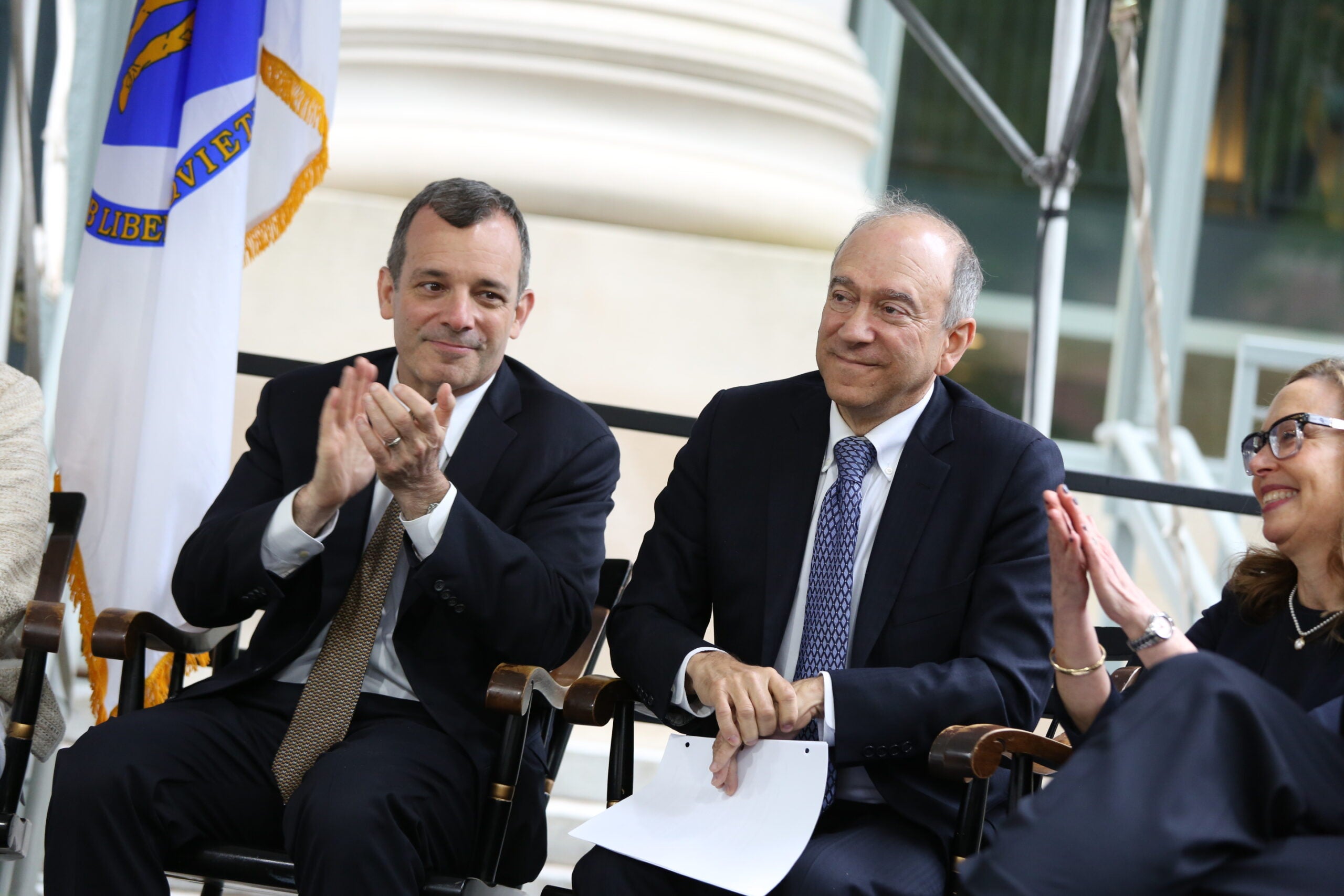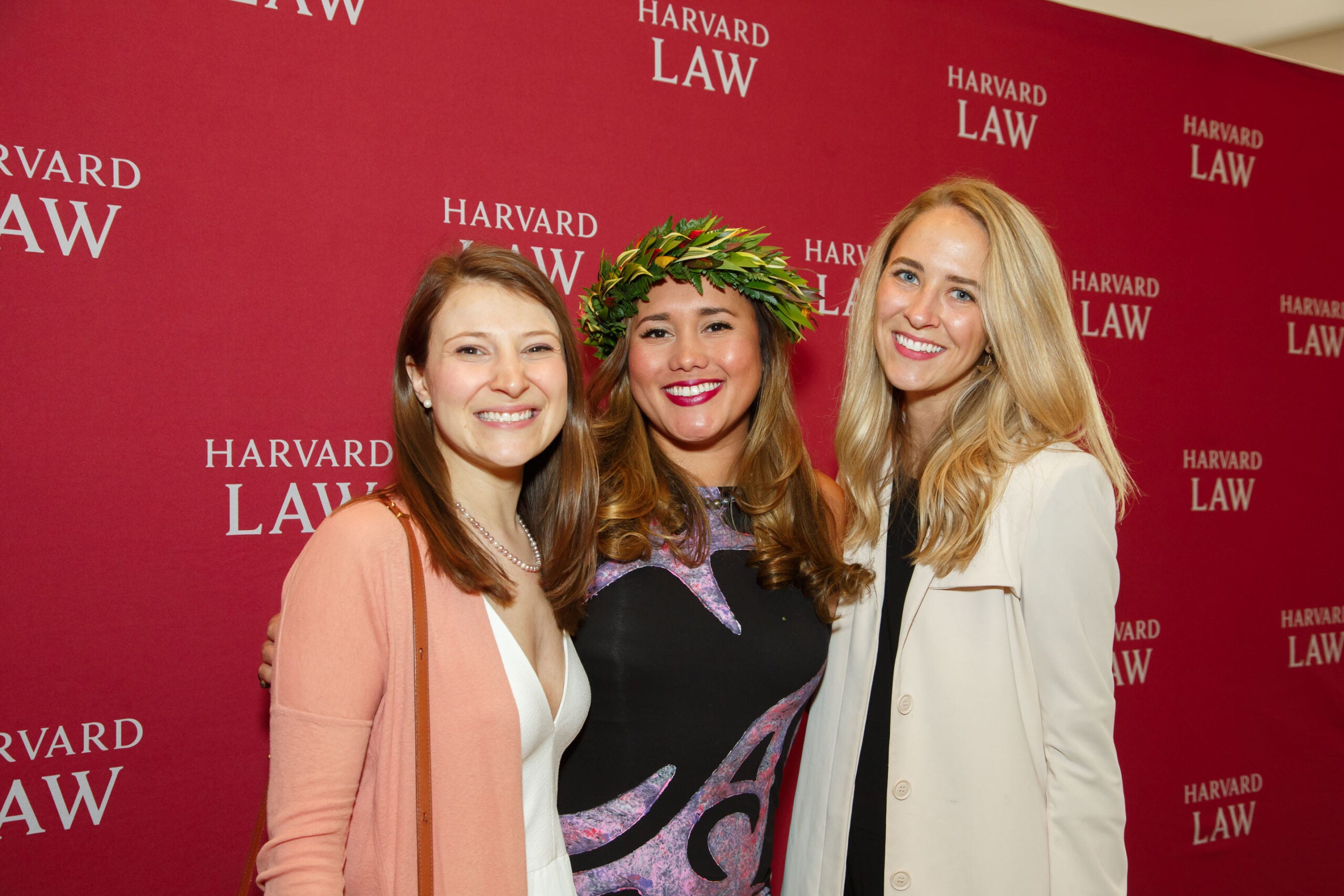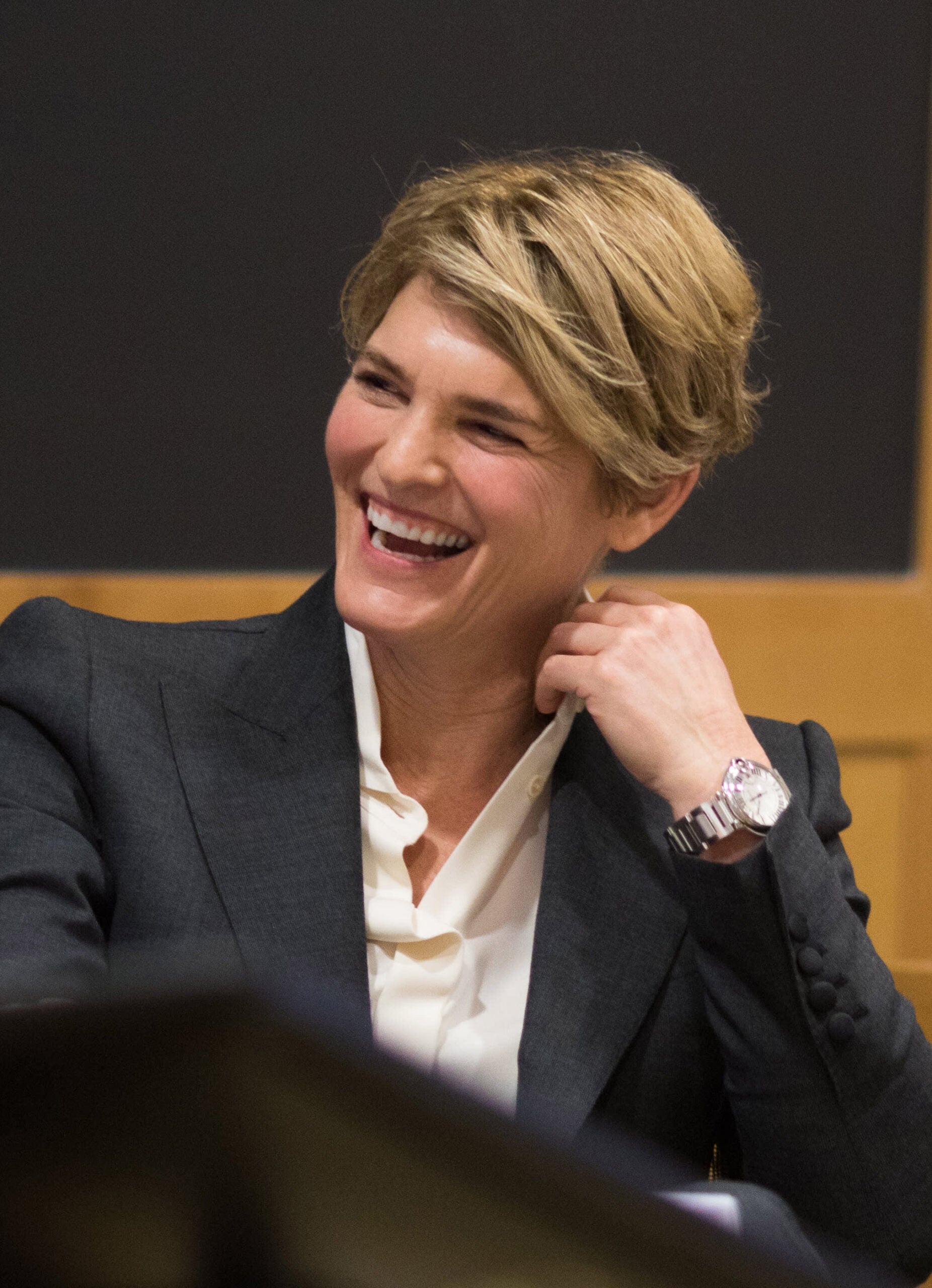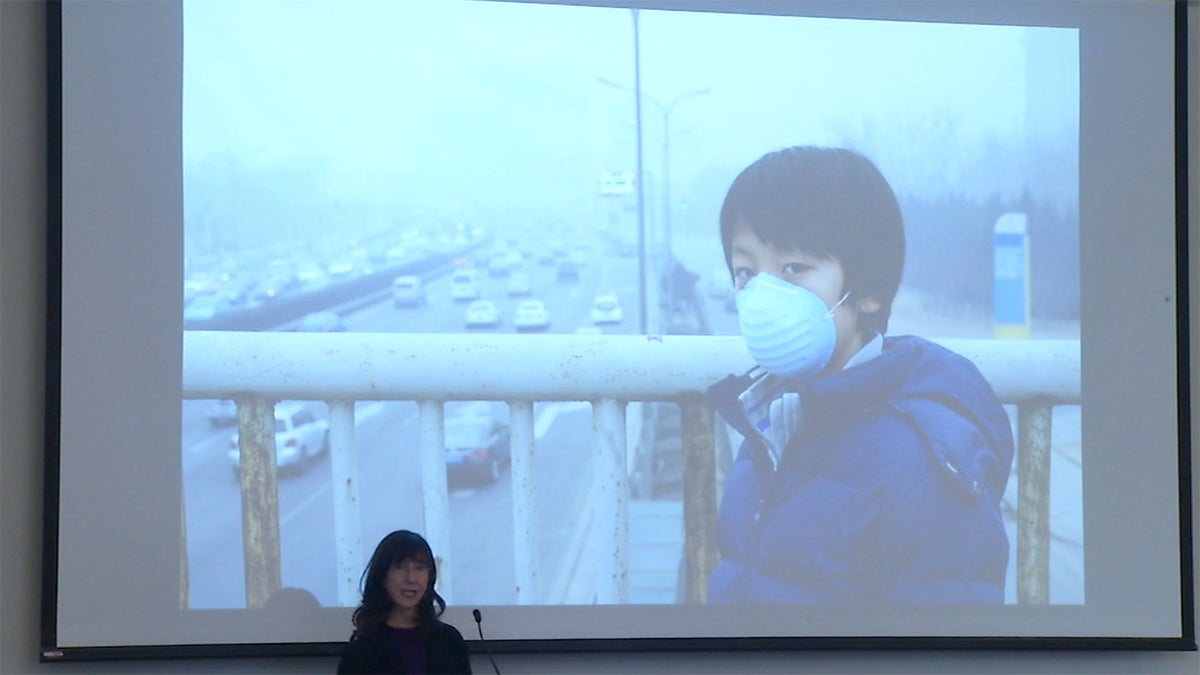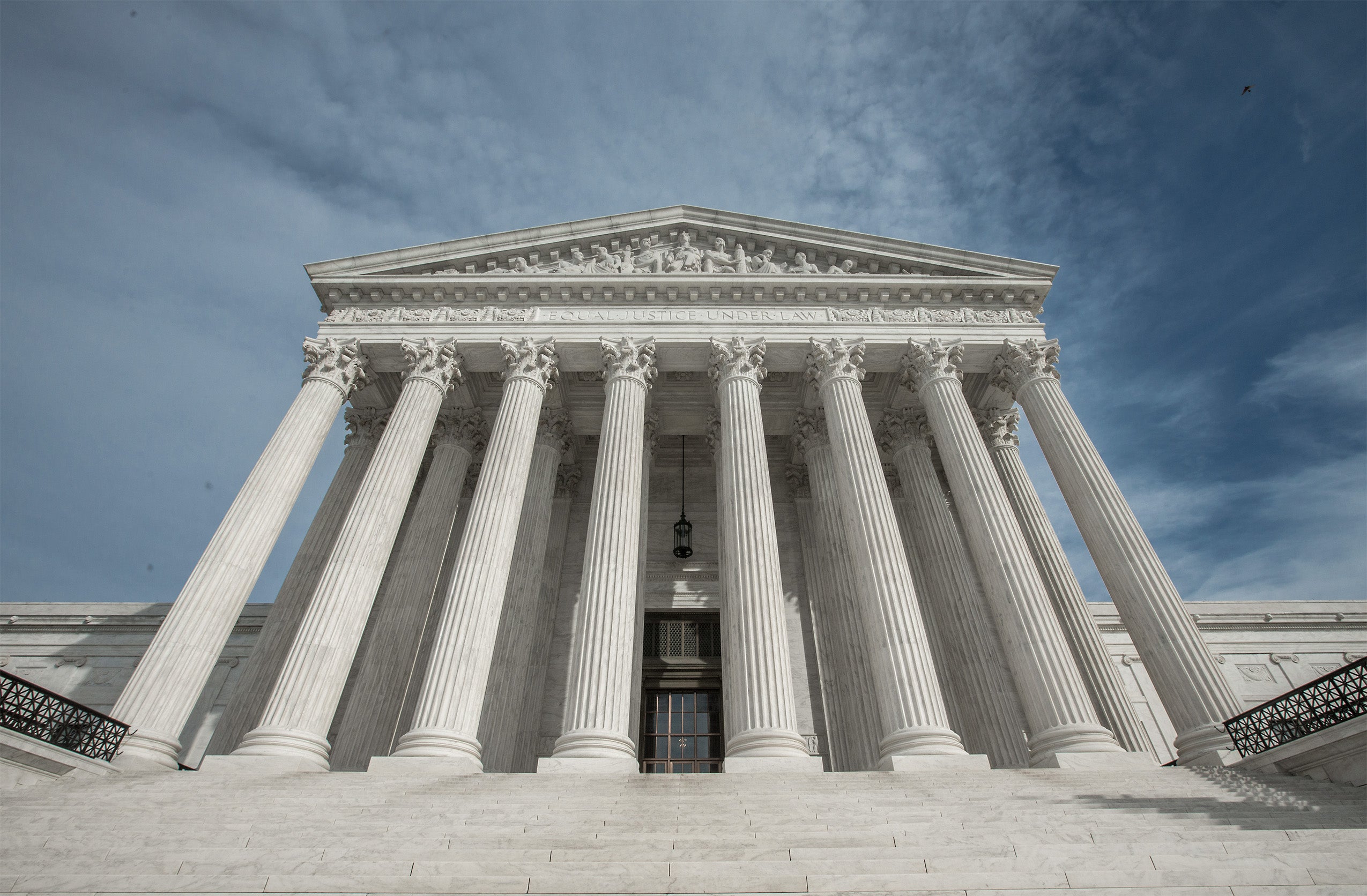People
Richard Lazarus
-
The Harvard Law School’s Class of 2019 chose Richard Lazarus ’79 to receive the prestigious Albert M. Sacks-Paul A. Freund Award for Teaching Excellence. Accepting that award at Class Day, Lazarus turned his appreciation back to the graduating HLS students.
-
Snapshots: Harvard Law School Class Day 2019
May 29, 2019
The Class of 2019 celebrated Class Day with friends and family, faculty and staff, and special guests on Harvard Law School's Holmes Field.
-
Opaque Trade Groups May Need To Name Names In Court
May 15, 2019
A key utility industry advocacy group represented by Hunton Andrews Kurth LLP has disbanded in the face of Congressional scrutiny over the identity of its members, and similar groups that rely on anonymity are getting pressure from some courts about whether they have standing to fight energy and environmental regulatory actions. The Utility Air Regulatory Group — which for four decades lobbied and litigated on federal air pollution issues on behalf of utility companies who largely kept their names under wraps — disbanded on Friday. It is one of scores of similar ad hoc groups — with opaque membership rolls unlike traditional trade associations — that have played leading roles in challenging federal energy and environmental rules. ...“Judge Pillard’s apparent invocation of the kind of tougher Article III standards often promoted by business interests to seek to persuade courts to deny environmentalists Article III standing is, to say the least, ironic,” Harvard Law School environmental law professor Richard Lazarus said. “If Judge Pillard’s suggestion at argument ends up having judicial legs, it may well prompt a healthy reform of the practice of organizations like UARG that for too long have declined to reveal their members.”
-
The American Academy of Arts and Sciences has announced that Jody Freeman LL.M. '91 S.J.D. '95, Archibald Cox Professor of Law, has been elected a member of the honorary society, one of twelve members of the Harvard faculty to receive the honor this year.
-
Video: Will China Save the Planet?
March 15, 2019
China, the world's largest carbon emitter, is leading a global clean energy revolution. But as leading China environmental expert Barbara Finamore explains in her latest book preventing "environmental catastrophe" is anything but easy.
-
Lawyers in love shouldn’t behave like lawyers, according to advice from one of six married couples from Harvard Law School’s class of 1979. All six couples met while first-year students in Harvard’s Section 3, which is similar to a homeroom period, the New York Times reports. ...The article prompted Harvard Law professor Richard Lazarus to alert the Times to a bigger romantic feat: Six couples from Section 3 of the Class of 1979 had not only married; they remain married to this day. He dubs the section the “love section.”
-
Harvard Law School’s Class of 1979: The ‘Love Section’
March 5, 2019
After our article on Jan. 19 about three marriages from a Harvard Law School section, Richard J. Lazarus wrote The Times. Professor Lazarus, who also teaches first-year law students at Harvard, applauded the newlyweds and his friend and colleague Jon Hanson, the head of that featured section (1L, Section 6). But as a member of the Class of 1979 and as someone familiar with all things Harvard Law, Professor Lazarus also wanted to alert us to an even higher romantic bar set by 1L, Section 3: Six couples not only married from that section, but — drum roll please — they are all still married. “I am happy to report that, 40 years later, all six couples are still intact,” said Professor Lazarus, who refers to that section as “the love section.” (Professor Lazarus was a student in Section 4 that year.)
-
Faced With Bad Optics, Trump Recalls Workers
January 18, 2019
From tax return processors to food inspectors, the Trump administration this week ordered tens of thousands of federal employees back to work – many without pay – at agencies involved with the most politically sensitive of issues. More than 40,000 IRS employees were told to report for work after criticisms that tax returns would not be processed in time – a development that assuredly would have sparked outrage among taxpayers. ... "There's nothing in the statute that I'm aware of, or any regulations that have interpreted the terms of the emergency exception, to include a 'Really Important Things That We Think the Government Should be Doing and Would be Really Unpopular if They Don't Do Them' exception," says Richard Lazarus, law professor at Harvard University. "I don't know how that possibly fits – but they know there will be hell to pay if people don't get their tax refunds."
-
How the courts can help in the climate change fight
December 17, 2018
A Quebec environmental group is taking the federal government to court. ENvironnement JEUnesse filed a class-action suit on behalf of Quebeckers aged 35 and under seeking a declaration that the government’s behaviour in the fight against climate change infringes on their human rights. The claim also seeks punitive damages.... Harvard law professor Richard Lazarus characterizes efforts to legislate solutions to systemic challenges such as climate risk as “super wicked problems.” He observed that “climate-change legislation is especially vulnerable to being unravelled over time … especially because of the extent to which it imposes costs on the short term for the realization of benefits many decades and sometimes centuries later.”
-
$400K for SCOTUS Clerks: A Bonus Too Far?
November 15, 2018
...Thirty-one years later, the prevailing hiring bonus for Supreme Court clerks is $400,000—up from $300,000 in 2015. And that does not include salaries. If the trend continues, the clerk bonus will soon approach twice the annual salary of the justices they work for. Associate justices are paid $235,000, and the chief justice gets $267,000...“When the numbers get so high—in terms of the bonus itself and the numbers of hires going to one firm—it unavoidably raises concerns about what is being purchased and the meaning of public service,” Harvard Law School professor Richard Lazarus said in 2015. Lazarus, reached this week, said he stands by those remarks, adding that “a vast majority” of the Jones Day hires are likely to leave the firm in a few years. “Jones Day is paying a lot of money for a photograph,” he said.
-
...Others said Kavanaugh’s comments were more than spur-of-the-moment outrage.“Rather than strive, as most others have done, to dissipate the partisan atmosphere, Judge Kavanaugh chose to throw the testimonial equivalent of gasoline on it,” Harvard law professor Richard Lazarus, formerly head of the Georgetown Law Center’s Supreme Court Institute, wrote in an email. “Perhaps out of uncontrolled fury at the nature of the accusations directed to him. Or perhaps based on a political calculation that it was the best or even only way to garner the support, including that of the tainted president who nominated him, necessary to maximize his prospects of confirmation. I do not know which it was.”
-
It is easy to answer the question of how Brett M. Kavanaugh will be received by his fellow justices at the Supreme Court after a historically bitter and tumultuous confirmation battle: as one of nine equals, with whom they will work for the rest of their careers. The tougher question is how months of partisan warfare will affect the court’s image...The discretionary part of the docket will be an important thing to monitor, said Richard Lazarus, a Harvard law professor who closely watches the court. “One bellwether might be the nature of the legal issues the justices accept for review in the near future,” he said. Speculation has been that the newly energized right side of the court might want to take cases that push the envelope, now that the more moderate Justice Anthony M. Kennedy has been replaced by conservative Kavanaugh, Lazarus said. “Perhaps now those four, including Kavanaugh, might decide it is prudent for the court, for the good of the nation, to reduce the court’s profile,” he said.
-
Trump says Supreme Court Justice Brett Kavanaugh was ‘proven innocent’ in confirmation battle
October 9, 2018
...Though more eyes may be on Kavanaugh, Roberts may be the most important justice after the retirement of Kennedy, the court's swing vote. Kavanaugh is likely to align with the court's more conservative justices, making Roberts the most likely to join the court's four liberals on occasion. “He won’t be as liberal in some dimension as Kennedy, but he’ll be more of an incrementalist,” said Harvard Law School professor Richard Lazarus, a Roberts classmate there in the 1970s.
-
Amid Kavanaugh Clash, Law Profs Say Appearance Has No Place in Clerkship Recruiting
September 24, 2018
Richard Lazarus has advised hundreds of clerkship hopefuls during his seven years on the faculty at Harvard Law School, and the 15 years he spent at Georgetown University Law Center before that. Never once has he broached the subject of appearance with a student in regards to landing the job. That’s not entirely true. There was the time many years ago when he asked a female student, after the fact, whether she had removed her facial piercings for an interview with a federal appellate judge. “I recall she looked at me quizzically and exclaimed something like, ‘Of course! I wanted to get the clerkship!’” Lazarus said. “Which she in fact did secure and she has since enjoyed a wonderfully successful career, first at the U.S. Department of Justice and later as a tenured law professor.” Lazarus and others said that urging law students to look a certain way to appeal to a hiring judge—as prominent Yale Law School professor Amy Chua is said to have done with female students seeking clerkships with U.S. Supreme Court nominee Brett Kavanaugh—isn’t standard practice.
-
The Political Solicitor General
August 22, 2018
With the Supreme Court divided ideologically along partisan lines for the first time in history, the Solicitor General—no matter the administration—has become more political. How did this post, long regarded as the keel keeping the government balanced, come to contribute to forceful tacks one way or the other, to the Court’s seeming indifference?
-
How Ginsburg’s reversal of Kavanaugh saved ‘huge’ air rule
August 16, 2018
...To this day, Ginsburg's opinion in EPA v. EME Homer City Generation LP remains the only time the Supreme Court has reversed one of Kavanaugh's environmental rulings on the U.S. Court of Appeals for the District of Columbia Circuit. A George W. Bush appointee, Kavanaugh has been on the D.C. Circuit for a dozen years. The case provides a glimpse into the nominee's broader approach to environmental law and how that may translate on the Supreme Court bench. "It's a very significant case. It's a huge environmental regulation at stake," said Richard Lazarus, a professor at Harvard Law School who has argued in front of the Supreme Court more than a dozen times. "It shows you exactly the potential divide between Kennedy and Kavanaugh, and also between Roberts and Kavanaugh. "That's why it's the most significant data point for environmental law in thinking about Kavanaugh's nomination," he said.
-
Judge Kavanaugh could give conservatives the vote they need to rein in EPA rules on climate change
July 24, 2018
...Now as federal appellate Judge Brett M. Kavanaugh seeks to replace the retiring Kennedy on the Supreme Court, Kavanaugh’s 12-year record of skepticism toward such agency actions puts the landmark decision and other environmental protections at risk. Environmentalists fear that if Kavanaugh joins the court, he would vote to block anti-pollution regulations for decades, long after President Trump has departed...“That will be a major issue of litigation with a huge impact,” said Harvard law professor Richard Lazarus. “I can’t say how Judge Kavanaugh would react, but I can say Justice Kennedy would have been skeptical of taking away the state’s power in this area.” He predicted Kennedy’s retirement could have a major impact in two other areas of environmental law: clean water and endangered species.
-
Yale Law Divided Over Kavanaugh Nomination
July 24, 2018
...But Harvard Law professor Richard Lazarus, whose quote about Kavanaugh being “an outstanding member of our teaching faculty” was included in the White House release, said Friday that many of the law professor comments fall short of actual endorsements. Lazarus said he deliberately took no position on whether the Senate should confirm Kavanaugh. “A look at the actual words of many of those academics stop well short of a formal endorsement of the nomination,” he said. “They instead heap deserved praise on Judge Kavanaugh for his outstanding contributions to our law schools, as a teacher in particular. The question of whether, in the current political climate, senators should vote for or against Judge Kavanaugh’s confirmation raises many additional considerations, which my quote does not go on to address.”
-
...Kavanaugh has insisted on upholding the expansion of regulatory authority only when there is clear evidence Congress intended to do so. "It is a perfectly legitimate neutral principle for interpreting federal statutory authority," said Richard Lazarus, a professor of environmental law at Harvard. "But as applied to EPA, it had led Kavanaugh repeatedly and consistently to rule against EPA."
-
Brett Kavanaugh: ‘The Earth Is Warming’
July 17, 2018
...Kennedy famously determined the direction of the nine-member court—joining its four liberals on some cases, its four conservatives on others—but he shaped few parts of American law as completely as he shaped the environment. Since joining the court in 1988, Kennedy voted in the majority in every environmental case in front of the court except one, according to Richard Lazarus, a Harvard Law professor who has argued more than a dozen cases in front of the justices...“We probably have more of a record for Kavanaugh for environmental law than we do for anyone else in recent memory,” Lazarus told me. “Roberts came from the D.C. Circuit, Scalia came from the D.C. Circuit, Ginsburg did, Thomas did—but none of them had the same number of EPA cases that Kavanaugh’s had.”
-
Some See Career Conundrum in Law Firms’ Energy Work
July 17, 2018
...That may be why Harvard Law School professor Richard Lazarus, an environmental law specialist, said he has yet to see students recoil from law firms that do energy work the way many rejected firms handling tobacco clients several decades ago. “Energy work broadly defined, including representation of utilities and even major oil and natural gas companies, has not yet seemed to trigger that same reaction in students looking for private sector employment in the Big Law firms, which frequently have a very wide client base that include that industry among many others,” he said in an email.
